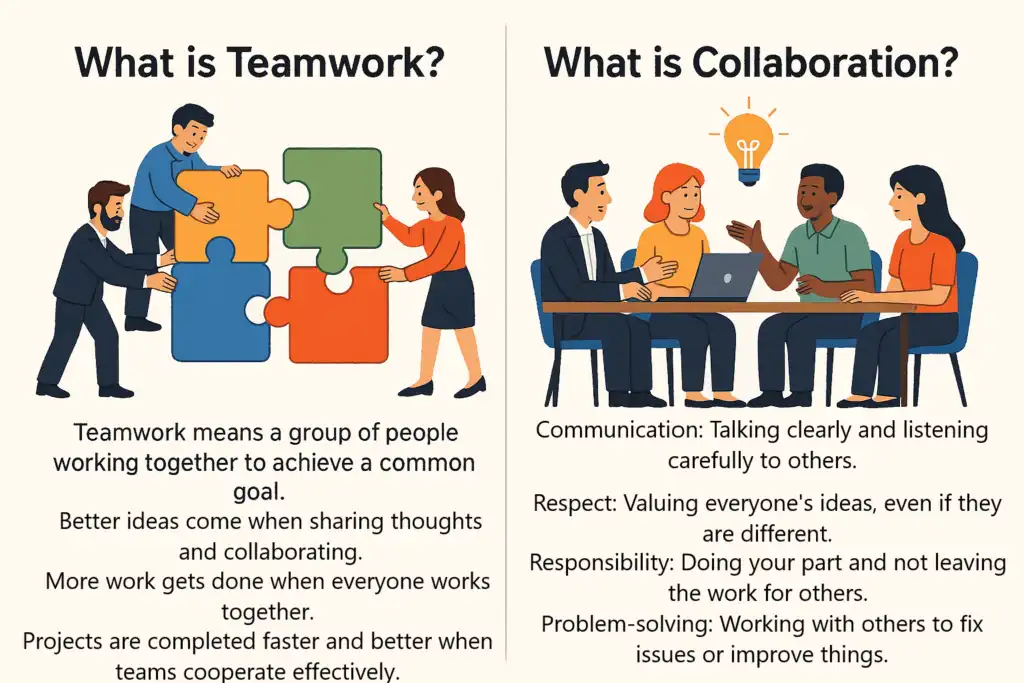What is Teamwork?
Teamwork means a group of people working together to achieve a common goal. Instead of one person doing everything alone, everyone shares the work based on their skills, ideas, and strengths. Think of a sports team—like in cricket, football, or basketball. Each player has a different role, but they work together to win the game.

What is Collaboration?
Collaboration is similar to teamwork, but it focuses more on sharing ideas, communicating, and solving problems together. It’s about cooperating with others, even if they have different opinions or backgrounds.
Imagine a group project in school. If everyone talks, listens, gives input, and helps complete the task—that’s collaboration.
Why Are Teamwork and Collaboration Important?
They are very important in school, college, offices, and even in daily life because:
- Better ideas come when people share their thoughts.
- More work gets done when people divide the tasks.
- It’s more fun and less stressful when people help each other.
- Projects are completed faster and better.
- People learn how to communicate, respect others, and work in harmony.
Skills Needed for Good Teamwork & Collaboration
To work well in a team, you need some important skills:
- Communication – Talking clearly and listening carefully to others.
- Respect – Valuing everyone’s ideas, even if they’re different.
- Responsibility – Doing your part and not leaving the work for others.
- Problem-solving – Working together to fix issues or improve things.
- Patience and Support – Helping each other, even when things get tough.
- Flexibility – Being open to change and new ways of doing things.
Real-Life Examples
In School:
You and your classmates work on a science project. One does the research, another creates a poster, and someone else presents it. You all work together for a good grade.
In the Workplace:
In an office, a marketing team plans a campaign. One writes content, one designs the visuals, and another manages social media. When they collaborate, the campaign becomes a success.
What Happens Without Teamwork?
If there’s no teamwork:
- People argue or blame each other.
- Tasks are incomplete or done poorly.
- No one enjoys the process.
- The final result may fail.
That’s why learning how to work well with others is a life skill.
How to Improve Teamwork and Collaboration
- Listen actively – Don’t interrupt; let others finish speaking.
- Share ideas – Your input matters, so speak up.
- Be dependable – Do your part and meet deadlines.
- Encourage others – Appreciate teammates’ efforts.
- Solve problems calmly – Don’t fight; talk things out.
- Celebrate success together – Everyone’s effort counts!
Summary:
Teamwork and collaboration mean working together with others to achieve a common goal by sharing responsibilities, ideas, and efforts. While teamwork focuses on doing tasks as a group, collaboration emphasizes communication, problem-solving, and mutual respect. These skills are essential in school, work, and everyday life because they help get things done faster, improve creativity, and build stronger relationships. Good teamwork requires clear communication, respect, responsibility, and a positive attitude. When people work well together, they achieve better results, learn from each other, and enjoy the process.
Tags: accountability, active listening, appreciation in teamwork, collaboration, collaboration effectiveness, collaboration in projects, collaboration skills, collaboration tools, collaborative environment, collaborative mindset, collaborative problem-solving, collaborative solutions, collaborative work environment, collective effort, collective goals, collective intelligence, Communication, conflict management, conflict management in teams, Conflict Resolution, conflict resolution skills, cooperation, cooperative environment, cooperative work, creative collaboration, cross-functional collaboration, decision-making in teams, diversity in teams, Effective Communication, feedback, feedback loops, flexibility, goal achievement, goal setting, group accountability, group cooperation, group coordination, group decision-making, group dynamics, group efficiency, group effort, group engagement, group problem-solving, group projects, group responsibility, group success, group work, idea generation, idea sharing, interpersonal communication, interpersonal skills., leadership, leadership in collaboration., leadership in teamwork, listening skills, marketing team, motivating team members, mutual respect, mutual support, office teamwork, patience, peer support, positive team culture, positive work culture, problem-solving, problem-solving skills, productivity, project outcomes, project planning, project success, respect, respect for differing opinions, respect for diversity, responsibility, role distribution, role flexibility, shared goal, shared responsibility, shared vision, skills sharing, success celebration, support, task completion, task delegation, task division, task fulfillment, task management, task prioritization, team accountability, team alignment, team brainstorming, team challenges, team cohesion, team collaboration tools, team communication tools, Team Coordination, team efficiency, team engagement.Collaboration techniques, team innovation, Team motivation, team performance, team performance metrics, team performance optimization, team roles, team roles and responsibilities, team spirit, team success, team synergy, team training, team-building activities, team-building exercises, teamwork, Teamwork and Collaboration, teamwork benefits, teamwork challenges, teamwork development, teamwork dynamics, teamwork improvement, teamwork in school, teamwork skills, teamwork strategies, teamwork success, transparent communication, trust, trust in teams, work satisfaction, workplace collaboration


